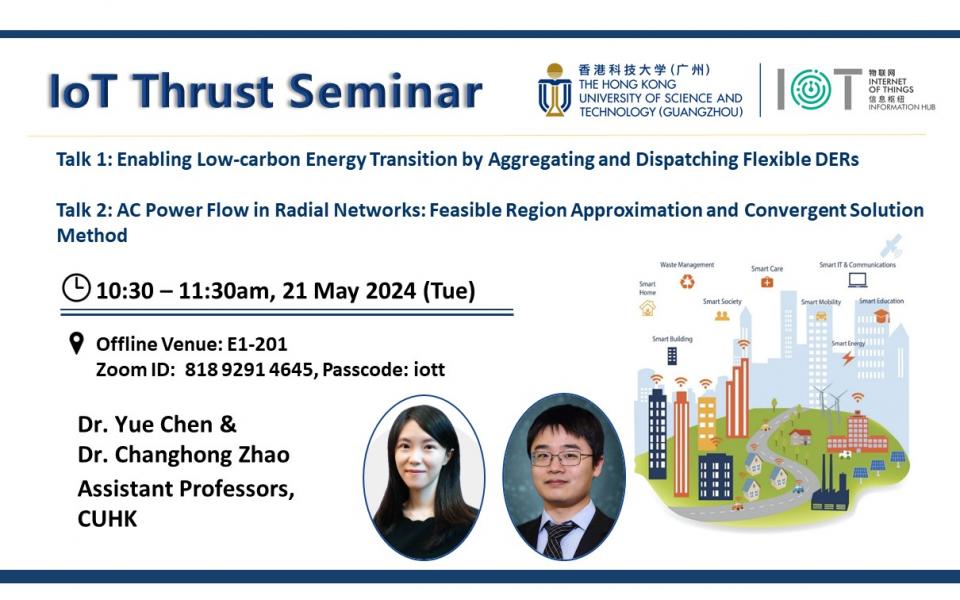IoT Thrust Seminar | Talk 1: Enabling Low-carbon Energy Transition by Aggregating and Dispatching Flexible DERs & Talk 2: AC Power Flow in Radial Networks: Feasible Region Approximation and Convergent Solution Method
Supporting the below United Nations Sustainable Development Goals:支持以下聯合國可持續發展目標:支持以下联合国可持续发展目标:
Abstract 1: Decarbonizing electric grids is one of the essential worldwide efforts to mitigate global climate change. At the same time, the electric grids are facing rising risks such as highly uncertain power supply and insufficient ramping capacity caused by fluctuating renewable generation. Distributed energy resources (DERs) exhibit a high potential for addressing these risks by serving as flexible demands or shifting energy over time via battery energy storage devices. In this talk, I will introduce our recent works on aggregating and dispatching DERs to accommodate renewable uncertainties. First, flexibility characterization methods are developed to evaluate the aggregate adjustable capability of DERs in an online and prediction-free manner. Then, robust DER dispatch methods are developed to address both exogenous and endogenous uncertainties therein, considering the trading of distributed predictions and the interactions among strategic DERs. These works provide fundamental techniques for economical and reliable operation of low-carbon energy systems.
Abstract 2: The growth of distributed and renewable energy sources in power grid is calling for more scalable and responsive operation schemes, particularly new methods to analyze and solve power flows in distribution networks. I will introduce two pieces of work on this topic. In the first work, we develop an optimization framework to approximate the feasible region of power injections under a nonlinear AC power flow model. The proposed approximation method is based on the convex second-order cone program (SOCP) relaxation and its dual for a feasibility problem. In the second work, we revisit a class of efficient AC power flow solution methods called backward/forward sweep (BFS), which utilizes the radial (tree) structure of distribution networks. In particular, we prove sufficient conditions under which the BFS methods converge to a unique solution with safe voltages.
Dr. Yue Chen is a Vice-Chancellor Assistant Professor in the Department of Mechanical and Automation Engineering at The Chinese University of Hong Kong (CUHK). Prior to joining CUHK, she received the B.E. and Ph.D. degrees in Electrical Engineering from Tsinghua University in 2015 and 2020, respectively, and the B.S. degree in Economics from Peking University in 2017. Her research interests include optimization and game theory, with applications to electricity markets, power and transportation nexus, and cyber-physical-social systems. She received multiple awards, including the Vice-Chancellor Early Career Professorship, the Dean's Exemplary Teaching Award, the Stanford Bits & Watts Postdoc Fellowship, the Excellent Ph.D. Thesis Award of Tsinghua, and the Best Reviewer Award of many international journals. Dr. Chen serves as an Associate Editor for IEEE Transactions on Smart Grid, IEEE Power Engineering Letters, and IET Renewable Power Generation. She is the Hong Kong Chapter Representative of IEEE PES Women in Power.
Dr. Changhong Zhao received B.E. in automation from Tsinghua University in 2010, and Ph.D. in electrical engineering from Caltech in 2016. He joined CUHK in 2019 after spending years on R&D with the US National Renewable Energy Laboratory. His research aims to make networked systems (e.g., power grid) more reliable, cost-effective, intelligent, and sustainable, by developing and applying theory and algorithms in optimization and control. He was a recipient of Ph.D. thesis prizes at Caltech, the Hong Kong RGC Early Career Award, and the IEEE PES Prize Paper Award.
